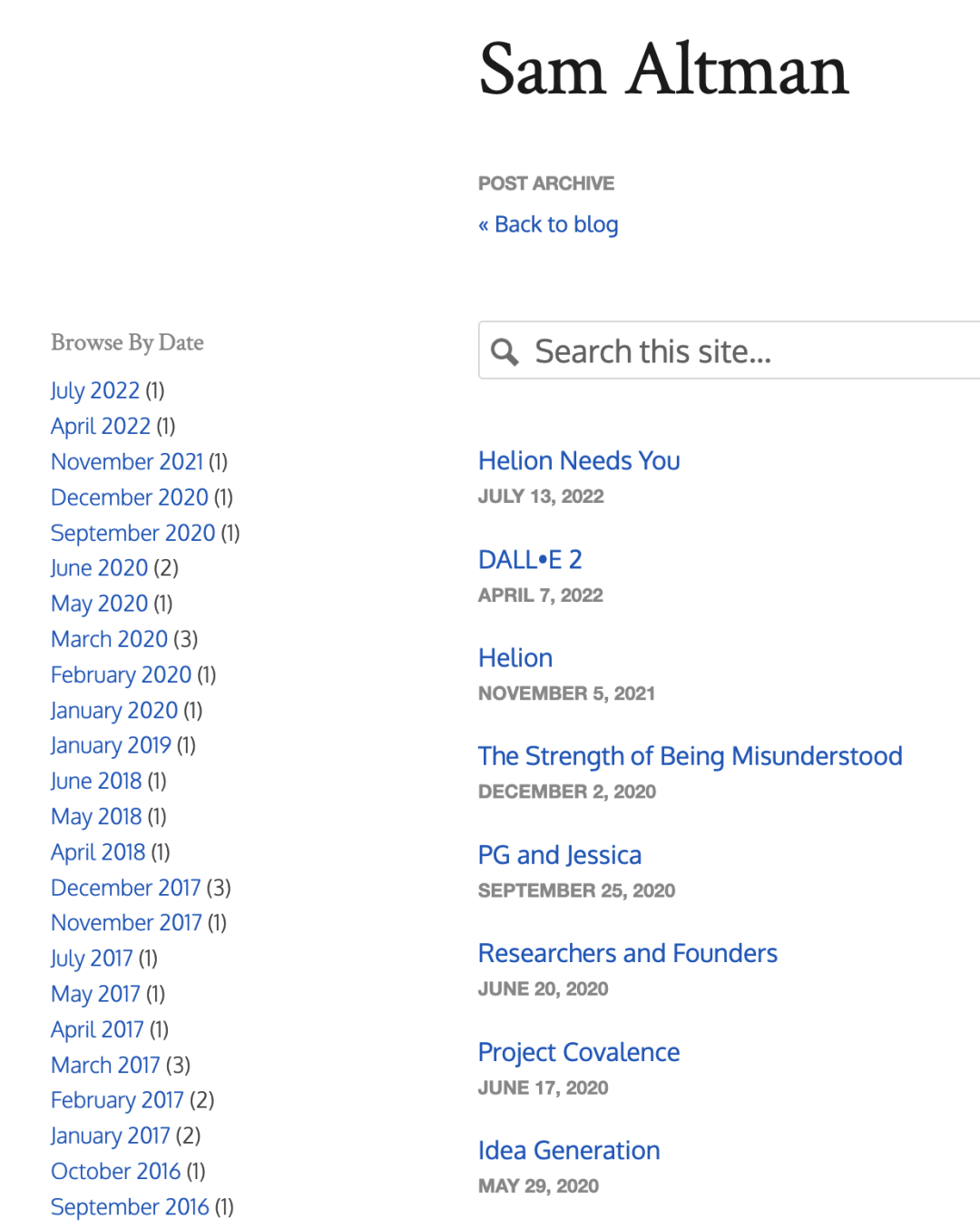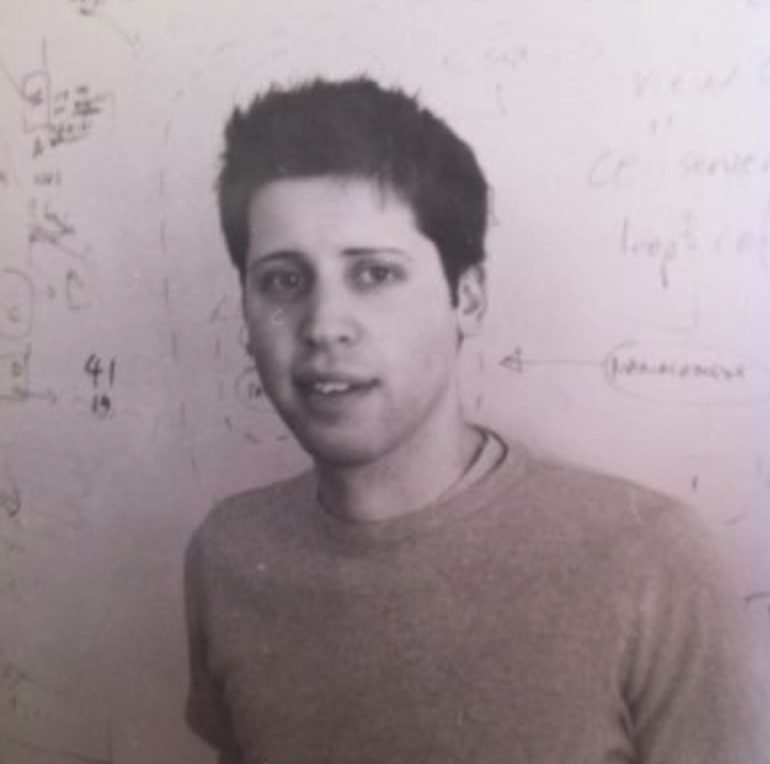By looking up Sam Altman’s blog, interviews and social media, found that he is a very thoughtful person, loves to think independently, and often likes to write “small essays” and tweet, sharing his views, predictions and progress on cutting-edge technology (AI), as well as his feelings about entrepreneurship and suggestions for start-ups and so on.

Sam Altman’s blog
The following selects 30 thoughts of Sam Altman in the field of artificial intelligence and entrepreneurship, which may inspire you:
01
To the three great technological revolutions–the agricultural, the industrial, and the computational–we will add a fourth: the AI revolution. This revolution will generate enough wealth for everyone to have what they need, if we as a society manage it responsibly.
02
one of the greatest skills of a leader is the ability to calm others in a storm.
03
My work at OpenAI reminds me every day about the magnitude of the socioeconomic change that is coming sooner than most people believe. Software that can think and learn will do more and more of the work that people now do. Even more power will shift from labor to capital. If public policy doesn’t adapt accordingly, most people will end up worse off than they are today.
04
Giving equity to employees is perhaps the key element to making startups work. it’s amazing to me that some countries make this so hard (sometimes totally economically impractical) and then wonder why they don’t have more successful startups.
05
one of the best things about elon is a reminder of just how much one person can do.
06
I think AI is going to be the greatest force for economic empowerment and a lot of people getting rich we have ever seen.
07
If you think that you understand the impact of AI, you do not understand, and have yet to be instructed further. if you know that you do not understand, then you truly understand.
08
Great execution is at least 10 times more important and a 100 times harder than a good idea. Great execution towards a terrible idea will get you nowhere.
09
A decade ago, the conventional wisdom was that AI would first impact physical labor, and then cognitive labor, and then maybe someday it could do creative work. It now looks like it’s going to go in the opposite order.
10
Entrepreneurship is very difficult to teach because original thinking is very difficult to teach. School is not set up to teach this—in fact, it generally rewards the opposite. So you have to cultivate it on your own. Thinking from first principles and trying to generate new ideas is fun, and finding people to exchange them with is a great way to get better at this. The next step is to find easy, fast ways to test these ideas in the real world. “I will fail many times, and I will be really right once” is the entrepreneurs’ way. You have to give yourself a lot of chances to get lucky. One of the most powerful lessons to learn is that you can figure out what to do in situations that seem to have no solution. The more times you do this, the more you will believe it. Grit comes from learning you can get back up after you get knocked down.
11
Focus is a force multiplier on work. Almost everyone I’ve ever met would be well-served by spending more time thinking about what to focus on. It is much more important to work on the right thing than it is to work many hours. Most people waste most of their time on stuff that doesn’t matter. Once you have figured out what to do, be unstoppable about getting your small handful of priorities accomplished quickly. I have yet to meet a slow-moving person who is very successful.
12
The biggest economic misunderstanding of my childhood was that people got rich from high salaries. Though there are some exceptions—entertainers for example —almost no one in the history of the Forbes list has gotten there with a salary. You get truly rich by owning things that increase rapidly in value. This can be a piece of a business, real estate, natural resource, intellectual property, or other similar things. But somehow or other, you need to own equity in something, instead of just selling your time. Time only scales linearly. The best way to make things that increase rapidly in value is by making things people want at scale.
13
Colleges prioritized making people feel perfectly safe over everything else and produced a generation afraid to fail, and thus afraid to take risk, and thus on pace to accomplish extremely little。
14
I’m confident in a future where there are a variety of AI systems. So, competing with Google or other competitors is a natural event. I reckon we’ll thrive in a competitive setting.
15
ChatGPT is like an e-bike for the mind。ChatGPT is incredibly limited, but good enough at some things to create a misleading impression of greatness. it’s a mistake to be relying on it for anything important right now. it’s a preview of progress; we have lots of work to do on robustness and truthfulness.
16
People have long been integrating new technologies into their lives — and into the classroom —and that those technologies will only generate more positive impact for users down the line.”Generative text is something we all need to adapt to,” he said. “We adapted to calculators and changed what we tested for in math class, I imagine. This is a more extreme version of that, no doubt, but also the benefits of it are more extreme, as well.” the world must adapt to generative AI and that technology will improve over time to prevent unintended consequences.It’s an evolving world,We’ll all adapt, and I think be better off for it. And we won’t want to go back.
17
I have used it to learn things myself and found it much more compelling than other ways I’ve learned things in the past,I would much rather have ChatGPT teach me about something than go read a textbook.
18
I think whenever someone talks about a technology being the end of some other giant company, it’s usually wrong. I think people forget they get to make a countermove here, and they’re like pretty smart, pretty competent. I do think there’s a change for search that will probably come at some point — but not as dramatically as people think in the short term.
19
This technological revolution is unstoppable. And a recursive loop of innovation, as these smart machines themselves help us make smarter machines, will accelerate the revolution’s pace. Three crucial consequences follow:
1、This revolution will create phenomenal wealth. The price of many kinds of labor (which drives the costs of goods and services) will fall toward zero once sufficiently powerful AI “joins the workforce.”
2、The world will change so rapidly and drastically that an equally drastic change in policy will be needed to distribute this wealth and enable more people to pursue the life they want.
3、If we get both of these right, we can improve the standard of living for people more than we ever have before.
20
A stable economic system requires two components: growth and inclusivity.
Economic growth matters because most people want their lives to improve every year. In a zero-sum world, one with no or very little growth, democracy can become antagonistic as people seek to vote money away from each other. What follows from that antagonism is distrust and polarization. In a high-growth world the dogfights can be far fewer, because it’s much easier for everyone to win.
Economic inclusivity means everyone having a reasonable opportunity to get the resources they need to live the life they want. Economic inclusivity matters because it’s fair, produces a stable society, and can create the largest slices of pie for the most people. As a side benefit, it produces more growth.
21
The technological progress we make in the next 100 years will be far larger than all we’ve made since we first controlled fire and invented the wheel. We have already built AI systems that can learn and do useful things. They are still primitive, but the trendlines are clear.
22
Compound growth gets discussed as a financial concept, but it works in careers as well, and it is magic. A small productivity gain, compounded over 50 years, is worth a lot. So it’s worth figuring out how to optimize productivity. If you get 10% more done and 1% better every day compared to someone else, the compounded difference is massive.
23
2023: $30,000 to get a simple iPhone app created, $300 for a plumbing job. i wonder what those relative prices will look like in 2028! the likely coming divergence between changes to cognitive work and changes to physical work could be quite dramatic.
24
A big secret is that you can bend the world to your will a surprising percentage of the time—most people don’t even try, and just accept that things are the way that they are.People have an enormous capacity to make things happen. A combination of self-doubt, giving up too early, and not pushing hard enough prevents most people from ever reaching anywhere near their potential.
To be willful, you have to be optimistic—hopefully this is a personality trait that can be improved with practice. I have never met a very successful pessimistic person.
25
Most people are primarily externally driven; they do what they do because they want to impress other people. This is bad for many reasons, but here are two important ones.
First, you will work on consensus ideas and on consensus career tracks. You will care a lot—much more than you realize—if other people think you’re doing the right thing. This will probably prevent you from doing truly interesting work, and even if you do, someone else would have done it anyway. Second, you will usually get risk calculations wrong. You’ll be very focused on keeping up with other people and not falling behind in competitive games, even in the short term.
The most successful people I know are primarily internally driven; they do what they do to impress themselves and because they feel compelled to make something happen in the world. After you’ve made enough money to buy whatever you want and gotten enough social status that it stops being fun to get more, this is the only force I know of that will continue to drive you to higher levels of performance.
26
I think AI is gonna just seep In everywhere.my basic model of the next decade is that the marginal cost of inteligence and the marginal cost of energy are going to trend rapidly towards zero,like surprisingly far.And those I think are two of the major inputs into the cost of everything else except the cost of things we want to be expensive, the status goods whatever.when like the whole cost structure of society change which happened many times before.
27
My belief is that all repetitive human work that doesn’t require the deep emotional connection between two people that will all be done in the next couple of decades better、cheaper and faster by AI. And that is somehow left out of the conversation.It’s always about factory robots and self-driving cars.But what they dont talk about is all of the white-collar work that AI is going to do.
28
OpenAI from a cold start a few years ago has managed to do the thing that i think is going to be incredibly important to the next many decades at least of society and how we all live our lives and what we do and what’s possible. I have tried to hold myself to the stuff i really love which tends to be like the hard tech、years R&D、capital intensive or like sort of risky art like risky research and then. But if it works,it really works.
29
One of the things we really believe is that the most responsible way to put this out in society is very gradually and to get people, institutions, policy makers, get them familiar with it, thinking about the implications, feeling the technology, and getting a sense for what it can do and can’t do very early. Rather than drop a super powerful AGI in the world all at once.
30
Don’t chase status. Status without substance doesn’t work for long and is unfulfilling. Do new things often. This seems to be really important. Not only does doing new things seem to slow down the perception of time, increase happiness, and keep life interesting, but it seems to prevent people from calcifying in the ways that they think. Aim to do something big, new, and risky every year in your personal and professional life.
Don’t judge other people too quickly. You never know their whole story and why they did or didn’t do something. Be empathetic. The days are long but the decades are short.







